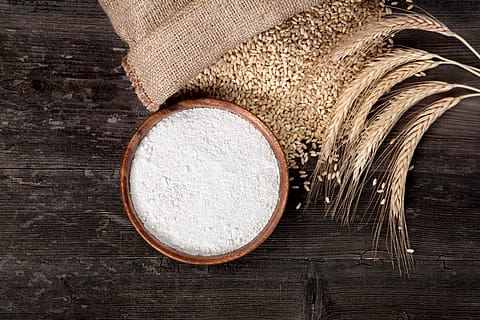Centre imposes curbs on wheat flour exports
The government says the global supply disruptions in wheat and wheat flour have created many new players and have led to price fluctuations and potential quality-related issues

The government has imposed restrictions on the outbound shipments of wheat flour, with effect from July 12. This new framework for exporting wheat flour comes following the government's May directive in which it banned the export of wheat amid major heatwaves in India.
A new notification issued by the commerce ministry’s directorate general of foreign trade (DGFT) puts in place a new framework under which exporters dealing in wheat flour will have to seek an inter-ministerial committee’s approval before sending any outbound shipment. The DGFT's new framework will be applicable to wheat flour (atta), maida, samolina (rava/sirgi), wholemeal atta and resultant atta, says the authority.
"Export policy of wheat flour (atta) remains ‘free’, but export shall be subject to recommendation of inter-ministerial committee (IMC) on export of wheat. The notification will come into effect from 12th of July, 2022. Necessary modalities with regard to the quality of wheat flour will be notified separately," says the DGFT notification.
Explaining the rationale behind the move, the government says the global supply disruptions in wheat and wheat flour have created many new players and have led to price fluctuations and potential quality-related issues. "Therefore, it is imperative to maintain the quality of wheat flour exports from India," it says.
The DGFT says from July 6, 2022, till July 12, 2022, some consignments of wheat flour, however, will be allowed to be exported. These shipments are those in which the loading of wheat flour on the ship has commenced before the DGFT notification; and where wheat flour consignment has been handed over to the customs before the notification and is registered in its system.
The government, on May 13, restricted wheat exports to manage the overall food security situation in India. The decision was also taken to support the needs of neighbouring and vulnerable countries adversely affected by the sudden changes in the global market for wheat and those unable to access adequate wheat supplies.
However, norms were relaxed a bit on May 17 amid disruptions in the export of wheat. The modified norms said the export curbs on wheat would not apply to consignments handed over to customs for examination and registered into its systems on or before May 13. The decision to ease restrictions was taken after reports said 1.8 million tonnes of wheat grains were stuck at various ports after the Centre's ban.
Recommended Stories
The Centre also came up with stricter norms to obtain registration certificates (RCs) for wheat exports to stop fraudulent practices by shady exporters who were found applying for RCs using "improper documents". To plug the loopholes, the registration authorities (RAs) now do a physical verification of all the letters of credits, whether already approved or under process. For that, they can take the help of a procession agency.